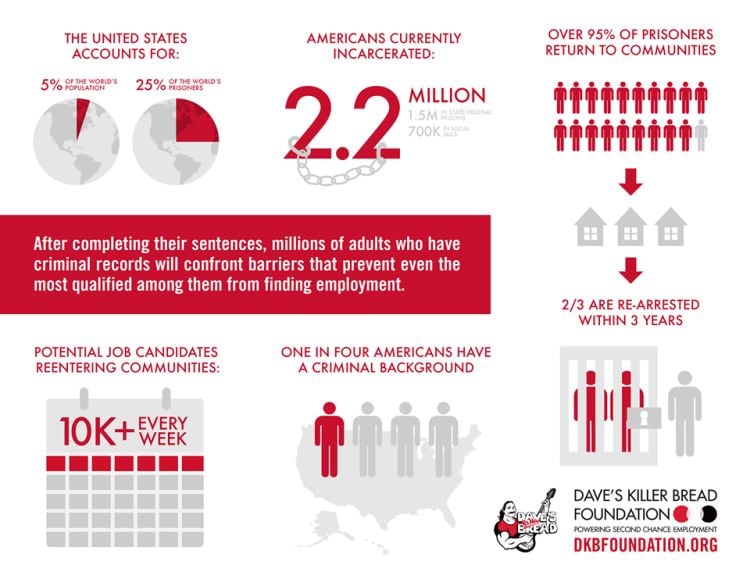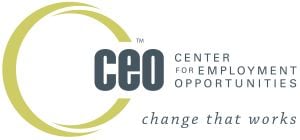Privately of course, even the most enlightened employers would probably admit to favoring the candidate without the rap sheet. But is this just a sensible application of the precautionary principle, or are employers being short-sighted (as well as discriminatory) when they do this?
Without a doubt it’s the latter, claims Genevieve Martin, executive director at nonprofit Dave’s Killer Bread Foundation, who says the best way to get employers to give ex-offenders a fair shot is “not just to appeal to their sense of morality, but to provide hard evidence” that people that have been incarcerated are no more likely to cause problems in the workplace than anyone else.
Ex-offenders performed equally or better in terms of disciplinary issues
While there aren’t scores of studies measuring how ex-offenders perform in the workforce versus other candidates doing the same jobs at the same companies, there is a lot of anecdotal evidence to suggest that they are equally reliable, if not more so, in part because they know they will find it harder than other candidates to find work, she said.

At Oregon-based Dave’s Killer Bread, for example (co-founded by ex-offender Dave Dahl and now part of Flowers Foods], employees that have formerly been incarcerated – accounting for around a third of the workforce – have been shown to be no more likely to be disciplined for workplace violations than counterparts minus a rap sheet, said Martin, who was speaking to FoodNavigator-USA after the Second Chance Summit in New York on May 24.
“The data hasn’t been published yet, but we looked at attendance violations, behavioral violations and policy violations, and in every area our ex-offenders performed equally or better than workers that had not been incarcerated, and that’s the kind of cold, hard data that I think will reassure employers.
“Obviously it’s just a small pool of data, but what we’ve been looking at is how do we build a larger study because we know that employers need those data points that they can take to their attorney or insurance broker and help them feel more comfortable."

The Center for Employment Opportunities (CEO) provides employment services to people with recent criminal convictions via structured and tightly supervised programs helping participants regain the skills and confidence needed for a successful transition to the workplace.
Employers worry that their liability will skyrocket, but that is not the case
Meanwhile, a far larger study – exploring the military records of people who joined the armed forces between 2002 and 2009 (when the longstanding policy of not hiring people with criminal records was temporarily revoked owing to recruitment shortages) - recently found that those who received felony waivers for enlistment were no more likely to be discharged for negative reasons than those without such waivers.

The study, conducted by Harvard University professor Devah Pager and University of Massachusetts Amherst professor Jennifer Lundquist and researcher Eiko Strader (which is being reviewed for publication), also found that enlistees with the felony waivers were “promoted more quickly and to higher ranks,” observed the authors.
“At Dave’s Killer Bread and at other businesses we’ve worked with, we’ve found that this section of the workforce is dedicated, motivated and loyal,” said Martin. “We call it attitude with gratitude. They know they have fewer options, and they have an incredibly strong work ethic.”
She added: “Employers also worry that their liability will skyrocket, but that is not the case. There are only specific instances where you could have an issue, so you maybe wouldn’t want someone with an extortion charge as your CFO, for example.
“We just need to educate more employers so that they are better informed about the risks.”
Worker Opportunity tax credit
Many employers are also unaware that there could be tax benefits to employing ex-offenders via the Worker Opportunity tax credit, which is available to employers for hiring individuals from target groups who have consistently faced significant barriers to employment, said Martin.
“It’s very underutilized. Larger corporations often know about it, but many smaller ones don’t know that it exists, and the money is just sitting there.”

“So instead of saying to an employer, this person needs a job, please give them a chance because it’s your civic duty, the pitch is that this person has proven themselves and they are a good candidate. Then it’s not a moral issue, you’re just making a business case."
Sam Schaeffer, CEO, Center for Employment Opportunities
Instead of saying it’s your civic duty to hire this person, we’re making a business case
While studies like the Harvard/Amherst paper can definitely change perceptions, however, one of the most effective ways to get ex-offenders back into the workplace is to actually prove to employers that they can show up for work on time and get the job done by creating short-term employment opportunities enabling them to gain skills and bridge the gap between prison and the workplace, says Sam Schaeffer, CEO at fellow nonprofit, the Center for Employment Opportunities.
“Again, it’s all about taking away the element of risk. We provide job readiness training and transitional work placements [CEO has contracts with housing authorities, parks departments and other organizations with maintenance budgets and pays ex-offenders for doing jobs such as highway maintenance] and then we connect people on the work placements with local employers when they are ready.
“So instead of saying to an employer, this person needs a job, please give them a chance because it’s your civic duty, the pitch is that this person has proven themselves and they are a good candidate. Then it’s not a moral issue, you’re just making a business case, because we understand that employers are running businesses.
“And fact that so many of the companies we work with are repeat customers tells you something.”
Rates of recidivism are demonstrably lower when organizations such as CEO work with ex-offenders
Despite the fact that rates of recidivism are demonstrably lower when organizations such as CEO work with ex-offenders, and data shows they actually pay for themselves (click HERE), says Schaeffer, "there is still a misalignment between the apparent enthusiasm for criminal justice reform and the lack of funding."
Read more about the Dave's Killer Bread Foundation HERE.
